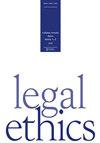Professional associations as regulators: an interview study of the Law Society of New South Wales
IF 0.3
Q1 LAW
引用次数: 4
Abstract
ABSTRACT Professional associations, once the bodies responsible for professional self-regulation, have lost regulatory power. Some have entered into co-regulatory arrangements with state or independent bodies; others have lost power entirely. But although self-regulation has been widely discredited, little research has examined how surviving regulator-associations are adapting to change and, in turn, how those adaptations affect their regulatory roles. Associations that have formal regulatory powers must reconcile their regulatory responsibilities with the need to retain membership and their desires to survive as organisations. This article examines the activities of the Law Society of New South Wales, an association jointly responsible for the regulation of the New South Wales legal profession. Drawing on the results of an interview study of the Law Society’s members and leaders, it analyses the Law Society’s formal and informal regulatory functions and shows how they interact with its commercial membership imperatives, to reveal where regulatory effects might be produced, or lost, and how. The findings support criticisms of association regulation and provide evidence of declining association influence. However, the association is also shown to embody self-regulatory, co-regulatory and corporate values simultaneously, reasserting regulatory influence and pursuing its own survival in the process.专业协会作为监管者:对新南威尔士州律师协会的访谈研究
专业协会作为曾经负责行业自律的机构,已经失去了监管权力。有些已与国家或独立机构订立共同监管安排;其他国家则完全失去了权力。但是,尽管自我调节已被广泛质疑,但很少有研究调查幸存的监管者协会如何适应变化,以及这些适应如何影响他们的监管角色。拥有正式监管权力的协会必须协调其监管责任与保持会员资格的需要以及作为组织生存的愿望。本文考察了新南威尔士州律师协会的活动,该协会共同负责新南威尔士州法律专业的监管。根据对律师会会员和领导人的访谈研究结果,本文分析了律师会的正式和非正式监管职能,并展示了它们如何与商业会员的要求相互作用,以揭示监管效应可能在哪里产生或失去,以及如何产生。研究结果支持了对协会监管的批评,并提供了协会影响力下降的证据。然而,该协会也同时体现了自我监管、共同监管和企业价值观,在此过程中重申监管影响力并追求自身的生存。
本文章由计算机程序翻译,如有差异,请以英文原文为准。
求助全文
约1分钟内获得全文
求助全文

 求助内容:
求助内容: 应助结果提醒方式:
应助结果提醒方式:


